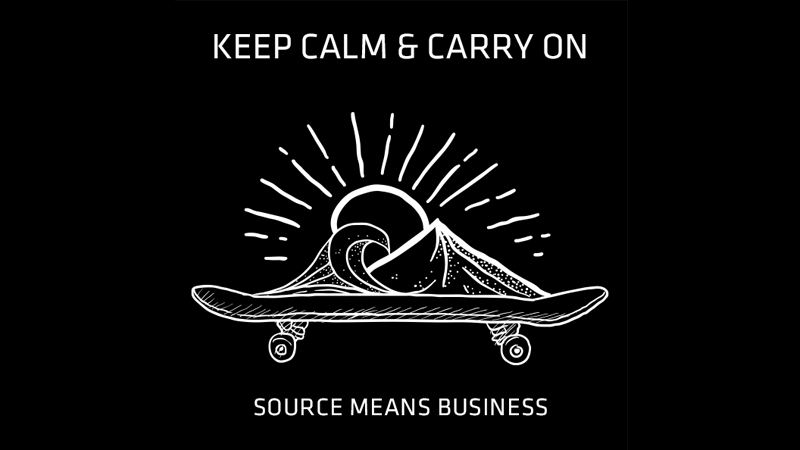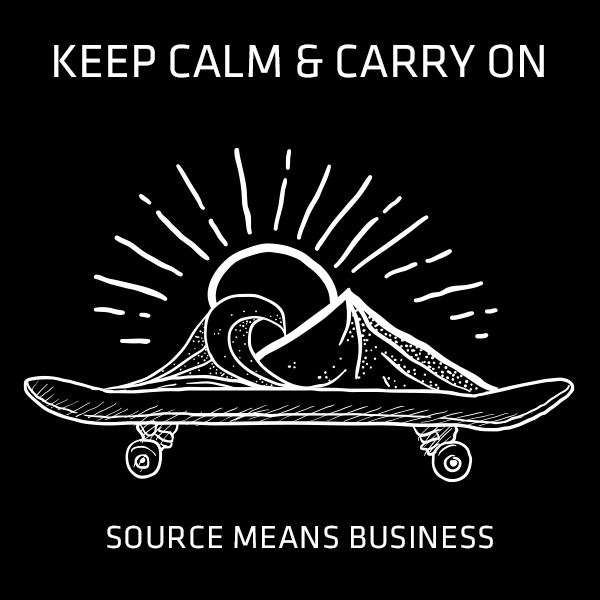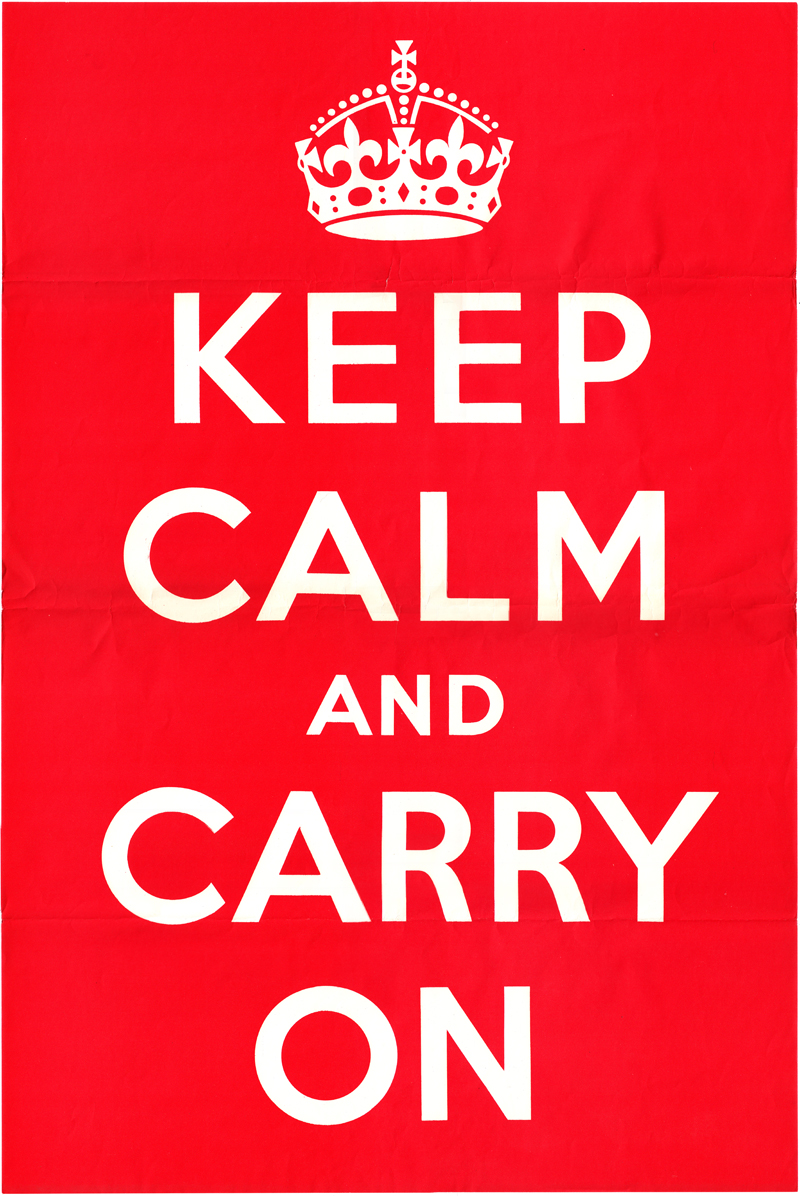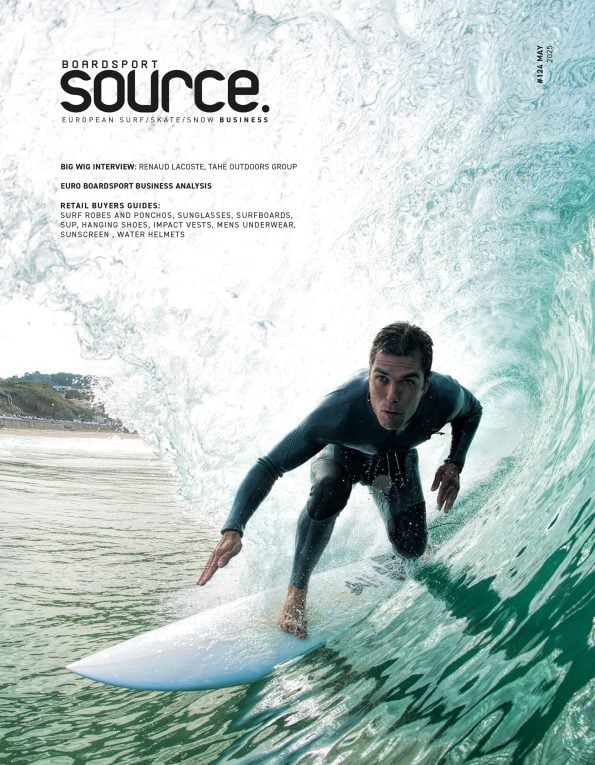
Keep Calm & Carry On: Insight From Expert Boardsports Biz Analyst
Jeff Harbaugh‘s been analyzing the boardsports industry since the 90s and anyone who subscribes to his e-newsletter always takes the 15 minutes it takes to absorb his expert analysis.

Here Jeff reflects on lessons learnt from the financial crash of 2008 and offers great insight in how the landscape could unfold over the coming months and how retailers and brands can best plan/capitalise. Thanks for the insight below, Jeff.

The poster with the slogan was issued in 1939 by the British. We don’t have anybody bombing our cities or threatening to invade us- exactly- but the coronavirus is a national challenge with social, financial and health related impacts unlike anything most of us have experienced. I’m not sure I’m overstating it to say that you had to be alive during World War II- maybe the attack on Pearl Harbor- to have had a similar experience. The speed with which it has hit us is remarkable.
I lived in Dublin for two years and I can tell you that when the Irish close the pubs, it’s serious.
I’ve watched stores close, brands lay off people, and inventory be put on sale at deep discounts. I’ve also seen cooperation among brands and retailers and companies offering some level of support to employees that they aren’t required to provide. If there’s anything hopeful it’s that we seem to be figuring out- more slowly than we should have- that we’re all in this together. A little more national leadership would be nice.
You all knew, I think, that assets were overpriced and that there would be, someday/eventually, a recession and a bear market. Something was going to cause it. It happened to be the virus and who saw that coming? Although, like with the recession, we knew that someday there would be another pandemic.
Those of you who thought the Federal Reserve had your backs now know better. This is all happening with interest rates at the zero bound, way too much debt, political disfunction and big wealth gaps.
But we’ll get through it- personally and from a business perspective. Maybe not quickly and certainly not without damage, but we will come out the other side. How quickly depends on how much short-term pain we’re willing to bear to avoid longer, deeper pain.
This kind of chaos can offer opportunities. I never expected it to be this bad, this gut wrenching, this out of left field, this short term destructive, but many of our industry’s problems with over supply, too many brands, lack of differentiable product, and too much retail is going to improve. I have no idea if it’s good that it’s happening so quickly.
The world changed with the Great Recession back in 2008. The recovery was weak and slow and, for many of our customers, nearly nonexistent. For various reasons the jobs they found to replace the ones they lost didn’t pay as much and, in any event, real wages for much of the population had stagnated for decades.
The sales increases we’d come to know and love got harder to come by. The consumer became powerful, demanding more but expecting to pay less. The internet revolutionized your relationship with your customer.
If you recognized the changing business environment after 2008 you did a few things. First, you focused on the quality of your brand even at the cost of some revenue because you knew brand value was all you had to work with.
Second, as part of your brand building, you were a bit more discriminating about your distribution.
Third, you focused on operating income and the bottom line rather than sales increases. That meant controlling your expenses by being more discriminating not just in how much you spent, but where you spent it.
Fourth, you yielded to the power of your customer and the internet. I’ve never liked the word, but let’s just say you omni channeled and move on.
That’s where part of that redirected spending went. It also went, and is still going, to developing the systems you need to collect, analyze and utilize customer data as part of critical relationship building.
Fifth, you rationalized your supply chain to reduce costs and inventory requirements. That may turn out not to have been a great idea, but around 2009, it seemed the right thing to do.
If you did these things, and aren’t a public company that borrowed too much money to buy back its shares to artificially increase your earnings per share (and now really, really wish you had that cash), you might be finding yourself with a debt free, strong balance sheet that lets you survive this while certain of your competitors crumple. That will be especially true if commercial interest rates continue to rise.
Even if you did everything I’ve described perfectly, it doesn’t mean the next months to year are going to be anything but hard. It’s tough to balance the needs of an economy with the requirements of managing a worldwide pandemic. The affects will be long lasting. Think about how your parents or grandparents (depending on your age) changed their long-term behaviors as a result of the Great Depression.
This will impact your business in a variety of ways, and no doubt in ways I haven’t thought of.
- Is the importance of online shopping going to accelerate and will that be permanent? What’s the impact on existing retail locations? One furniture store I know has closed, but if you call them you learn you can make an individual appointment to go to the store and have a one on one selling experience. If you want it.
- Is fast fashion finally going to shrivel? This seems to me to be consistent with the secondhand movement that’s become so mainstream. You can’t resell something that was only meant to be worn three times anyway.
- Disruptions in the supply chain, for however long they last, will also work against fast fashion.
- Maybe I don’t mean disruption, but rather permanent change in the supply chain. Will product be sourced closer to home? Will 3D printing finally take off?
- If some of your competitors fall by the wayside and you are making higher quality, longer lasting product, can you, in the longer term, raise prices and margins (hard to imagine that environment, huh)? Does that mean fewer pieces in inventory?
- If that happens, how will it change your relationship with your customer? Upgradeable product? A warranty that allows for one reconditioning? This could be a long list. How else might you come up with new ways to build your relationship with the customer into the product purchase?
- In the immediate future, how do you maintain your business structure and retain valued employees? As I imagine you are aware, some industry companies have closed stores but kept employees on the payroll. This is easier for big companies with solid balance sheets but it can’t go on forever.
- How can you turn your communications with customers on how you’re responding to the economic and health issues into a positive thing? There is a community of interests developing here you’ve probably never had with your customers. But be careful. I’ve been getting viral (pun intended) communications from various companies about how concerned they are and what they are doing, but many are from companies I haven’t done business with in an awfully long time- or ever. Those are definitely something I see as junk mail.
As I tend to do, I had collected some articles- mostly on retail- that I was thinking to share with you. But those articles are suddenly prehistoric- from January and early February.
We’re all in this together in a way we haven’t been in a long, long time and facing a recession caused by a dramatic decline in consumer demand (70% of the economy). Most recessions start with a decline in manufacturing. Governments are going to throw an amount of money you won’t believe at this and let’s hope it’s enough. But in the meantime, if brands/retailers, trying to compete, build bridges with customers and even their competitors and are mutually supportive with the goal of solving a common problem, I’m for it.
Keep calm and carry on.






